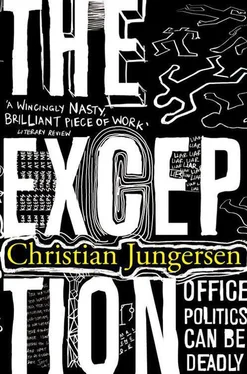Christian Jungersen - The Exception
Здесь есть возможность читать онлайн «Christian Jungersen - The Exception» весь текст электронной книги совершенно бесплатно (целиком полную версию без сокращений). В некоторых случаях можно слушать аудио, скачать через торрент в формате fb2 и присутствует краткое содержание. Год выпуска: 2010, Издательство: Orion Books, Жанр: Современная проза, Триллер, на английском языке. Описание произведения, (предисловие) а так же отзывы посетителей доступны на портале библиотеки ЛибКат.
- Название:The Exception
- Автор:
- Издательство:Orion Books
- Жанр:
- Год:2010
- ISBN:нет данных
- Рейтинг книги:3 / 5. Голосов: 1
-
Избранное:Добавить в избранное
- Отзывы:
-
Ваша оценка:
- 60
- 1
- 2
- 3
- 4
- 5
The Exception: краткое содержание, описание и аннотация
Предлагаем к чтению аннотацию, описание, краткое содержание или предисловие (зависит от того, что написал сам автор книги «The Exception»). Если вы не нашли необходимую информацию о книге — напишите в комментариях, мы постараемся отыскать её.
The Exception — читать онлайн бесплатно полную книгу (весь текст) целиком
Ниже представлен текст книги, разбитый по страницам. Система сохранения места последней прочитанной страницы, позволяет с удобством читать онлайн бесплатно книгу «The Exception», без необходимости каждый раз заново искать на чём Вы остановились. Поставьте закладку, и сможете в любой момент перейти на страницу, на которой закончили чтение.
Интервал:
Закладка:
Later that day Iben feels nauseous and shaky. She’s definitely not well and takes two aspirins, even though she can’t identify any aches or pains.
The Genocide News issue on Turkey has been badly delayed by the upsets of the last few days. She must try to concentrate. Even so, an hour before the end of the working day she can’t stand sitting there any longer. She must get home.
This anxiety is no stranger to her — she recognises it from when she was nineteen and suffered a breakdown: her body seizing up, as if she has caught a dreadful illness, but nothing hurts.
She is terrified of being referred to a psychiatric clinic and put back on medication again. Many of her former fellow patients are probably only able to exist with the help of mind-bending drugs. Ten years ago, Iben had to fight for her return to stability and real work and she isn’t certain she can do it again.
Before leaving the office she looks out to make sure that there’s no dark-haired, square-jawed man waiting down there in the street. It’s pointless, though. You can’t see properly from up here. Perhaps Dragan Jelisic is there. Perhaps he isn’t.
Iben announces that she needs to go home because she has a headache. She quickly checks the on-screen camera image. The landing is empty. The elevator is empty too. Nobody is waiting for her in the street.
She cycles away. For a February day it’s not that cold. Then she realises that her balance is too poor to continue cycling. She locks up the bike just a few hundred metres from DCGI.
Men, broad smiles on their faces, hold severed human heads in their hands. Archive images drift in front of her mind’s eye.
We distort our memories when it serves our purposes. Our thoughts, too. Even our senses cannot be trusted; we reshape the messages they send to suit our needs.
How much of what I’m thinking is nothing but the egoistic, post-hoc rationalisation that the professor was talking about?
When I stood up for Anne-Lise, I believed I was good. Was I lying to myself? Was my choice to risk my job and my friendship with Malene based on nothing more than a notion of what would be to my own best advantage?
Three million corpses scattered over the paddy-fields of Cambodia. All slaughtered by their own countrymen, believing they were right — but also because they felt that there might be something in it for them.
Five skulls, sticking up from a water-filled ditch. Plants, winding their way up, around and between them.
Sure, I might gain from losing my friend. I’d be free to date Gunnar. Also, I’d be free of the duty to help Malene, whose arthritis will only get worse with time.
How could I believe that I was making a sacrifice in order to resist the bullying? But I did believe it. I truly thought it was hard to make the choice I made. I felt heroic. Truly good.
‘Hey! Watch where you’re going!’
Iben walks with her head down, without looking where she is going. Now she has almost fallen over a small, white bulldog. Whining, it leaps sideways against a wall, obviously thinking that it’s about to be stepped on.
Its owner tells her off, while he pulls at the dog’s long, red leash. ‘You’re not the only one on the pavement, you know!’
‘I’m sorry. I’m so sorry!’ She sighs.
Meanwhile a thought has struck her. That’s it! Though I’ve seen myself as idealistic, I’ve lied to myself. That’s the evil act that has been gnawing at the back of my mind all day long. I couldn’t figure it out. But now that I know, my nausea will fade and disappear.
The sense of unease and queasiness does not leave her, however. She straightens up and looks around. She hasn’t gone very far. No one resembles Jelisic. She scans the streets in both directions. Pedestrians are few and far between, but he could be in any one of the cars. The traffic seems unending.
She cannot possibly defend herself against a man in a car.
She cannot possibly go home now.
Jelisic could find her there, no trouble at all — there is no steel-lined door, no CCTV camera. If she did go home, she wouldn’t be able to relax.
Crowded streets are her best hiding place. She walks quickly now, taking long, decisive strides. It helps against her tremor, which grows fainter the faster she walks.
No Jelisic at the Vibenhus roundabout or in Tagens Road or Nørrebro Street.
She practically flies along, one street after another, running to get away from Jelisic and from the evil she senses in everyone she overtakes. She knows that at one time in their life, each person she passes has done evil things towards another person, but they no longer think about it. They all pretend they’re so innocent.
If they thought it would benefit them, they would knife the next man in the back, each and every one of them. Only lack of opportunity determines if they become genocidal killers or not. If their community leaders pressed the right buttons, these people would be off on the hunt straight away.
When she gets to Nørrebro, there are more people about and it is harder to keep her distance.
Iben can smell the evil inside a young man cutting in just ahead of her. He is wearing a long coat and carries a briefcase, but she has a vision of him inside a Russian army helicopter throwing out mined toys to kill children in Afghanistan. Ruthlessness oozes from his pores and the smell prickles inside Iben’s nostrils, like the drinks of freshly opened lemonade she remembers from childhood.
She veers to pass him, steps into the cycle path and hears the bells as two cyclists come up from behind. She leaps back onto the pavement.
She lands near a young woman walking her old bike with a child-seat on the back. She is the type of person who, as a trained nurse, helped eliminate invalids in gas chambers well before the Second World War. Her brand of evil stinks like the raw meat left in a plastic bag that you forgot to throw out before going away on a holiday.
I’m like a rat, Iben tells herself. My sense of smell is a rat’s. A lab rat’s.
When they tickle one tiny bit of my brain with an electric current I’ll run one way and when they try another bit, I’ll run in the opposite direction. Like everyone would. Social psychologists can predict what I’ll do next. And when a researcher puts me in a cage with another rat, we will tear and bite each other until one of us dies.
That’s what we do, never mind what intellectual ideas we use for display. Razor-toothed rats without free will.
A little boy is strapped into the bicycle child-seat. He is asleep and his head in its little helmet is drooping. His romper suit is open at the neck and the smell of evil rises from him like the reek of burning grass.
I am sick, she thinks. It’s obvious. It isn’t normal to smell people like this. Or to think in this way. The next moment she is sweating copiously under her thin jacket. Her whole body becomes damp and cold.
She knows why. And she knows that she doesn’t want to think of what is to come. Her nausea grows, until at last she throws up. Leaning against a board advertising a kebab place, her stomach contents pump out of her and into the gutter.
Didn’t I have one of these attacks in the office one night? The others had left. I remember how furious I was with myself then. And with Malene. What was I doing there? It was something that eased the pressure. Some people smash china or cut themselves. What did I do?
What was I doing? I know I was writing. When I freak out, I write or I read.
She weeps.
I’m sick in the head. I don’t want to be sick. It’s hateful. I want to be able to work at DCGI. And to live with Gunnar.
I want a life.
I won’t have one much longer. The others will realise soon enough that I’m the one who’s abnormal. I’m the only one in the office who has been in a psychiatric ward. The only one who Frederik called ‘Batgirl’, because he — like the rest of them — can tell that I’m different. I’m the only one who’d willingly walk around for four months with a knife tied to my leg.
Читать дальшеИнтервал:
Закладка:
Похожие книги на «The Exception»
Представляем Вашему вниманию похожие книги на «The Exception» списком для выбора. Мы отобрали схожую по названию и смыслу литературу в надежде предоставить читателям больше вариантов отыскать новые, интересные, ещё непрочитанные произведения.
Обсуждение, отзывы о книге «The Exception» и просто собственные мнения читателей. Оставьте ваши комментарии, напишите, что Вы думаете о произведении, его смысле или главных героях. Укажите что конкретно понравилось, а что нет, и почему Вы так считаете.












